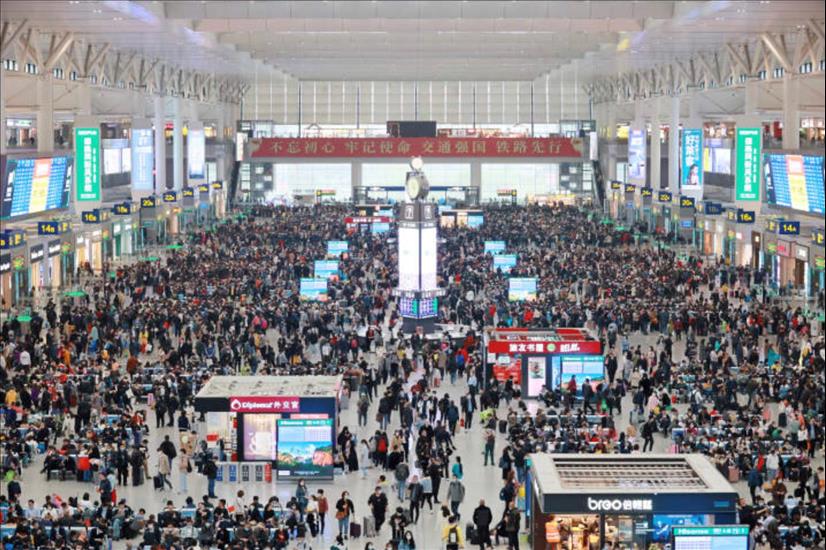(MENAFN- Asia Times) China's five-day May Golden Week break that started on May 1 brought out hordes of tourists as Covid-19 outbreaks kept other world cities in the doldrums. But while sightseers and travelers reveled in their hundreds of millions, they didn't generate the consumption boost of holidays past.
The Ministry of Culture and Tourism did not wait until the end of the holiday to announce its preliminary figures on tourist trips and takings, noting in a Xinhua circular on May 5 that about 230 million Chinese traveled – 30 million more than estimates and higher than the corresponding days of May 2019.
Xinhua revealed that total spending in this year's May Golden Week hit 113.2 billion yuan (US$17.5 billion), representing just 77% of the spending recorded in the same period two years ago.
The underwhelming takings ran counter to predictions run in state media in April, which predicted a boom time for retailers. That's led some media outlets and observers to speculate about why people are not spending as much as expected.

Shanghai's Hongqiao Station has seen a spike in traffic on the first day of China's May holidays. Photo: Xinhua
Chinese consumption has dragged since Covid-19 put growth in the first half of 2020 into negative territory. Economic output regained lost momentum in the remainder of 2020 to hit 100 trillion yuan, resulting in 2.3% overall year-on-year GDP growth. But consumption has remained tepid, falling 4% per capita in 202o, as people continue to tighten their belts amid pandemic uncertainty.
As a gauge of the hardship wrought by the pandemic and its associated economic slump, China's Engel coefficient, a measure of the share of food expenditure vis-a- vis people's total income, shot up to 30.2% in 2020. At the same time, savings and deposits increased by 1.6 trillion yuan, a measure of Chinese people's anticipation of uncertain times ahead.
There have already been calls for Beijing to ditch its fascination with national holidays to spur spending and instead pivot to focus on people's day-to-day lives as consumption fundamentals slow an economic rebound that has been largely export-driven.
Eric Mer, an associate professor with the Peking University's (PKU) School of Governance, told Asia Times he was surprised to learn that despite more people being on the move during the Golden Week that total spending turned out to be way off the high watermark of 2019.
'When the May holidays, with all the previous talk of the pent-up demand, turned out to be such an anticlimax, then we should temper our expectations for the longer National Day holidays in October as well as the traditional summer travel peak,' Mer said.
'Beijing perhaps pinned too much hope on holiday-driven spending and the latest, disappointing figures have wakened policymakers to the reality and Beijing must find other ways to persuade people to spend, like lower taxes and more social security coverage, rather than just longer holidays.'

Diners flock to a street market featuring local cuisine in Taizhou in Zhejiang province. The province received about 15 million tourists from the rest of China in the first five days of May.

Shoppers walk past a boutique store of French fashion house Balenciaga in the east Chinese city of Ningbo. Photos: Xinhua
The Beijing-based Caijing magazine, overseen by the state-owned CITIC Group, has also called upon Beijing to shift the focus from the middle class, major cities and holidays and tourism to the long-overlooked collective potential of the country's massive working poor, who could unleash more sustainable demand if their livelihoods are improved.
A recent report on consumption compiled by the PKU's Guanghua School of Management suggests that Beijing should redouble its efforts to double the income of those earning small pay packets and new entrants to the middle class, as the cost of living is weighing most heavily on people in the middle to low-income brackets.
China's hundreds of millions of migrant workers who flock to cities to work as cabbies, deliverymen and chefs cannot afford the luxury of taking long leave even during national holidays. They, however, are tipped as a potential new source of demand in the PKU report. One such worker can spend up to 44,000 yuan each year once he can settle down in a city with the rest of his family from the countryside, according to the report.
Fu Yifu, a senior research fellow with the Nanjing-based Suning Institute of Finance, also told Xinhua that Beijing and retailers should tap the massive untapped demand reservoir of lower-tier city and county dwellers. Fu said the supply of goods and services across the huge swathe of rural China and small cities was still inadequate.
'Of course residents there can travel to big cities like Beijing, Shanghai, Guangzhou and Shenzhen and other rich coastal urban centers [to spend] during May Golden Week or National Day break but they obviously cannot do that all year round. Brands and retailers perhaps should think about setting up shop on their doorstep to revive and grow,' said Fu.
Yum China, the subsidiary of the American fast-food giant that owns Kentucky Fried Chicken and Pizza Hut, said that during the Golden Week both brands reported higher gross takings across their restaurants in lower-tier cities and counties in central and western China than the ones in Beijing and Shanghai.
Read more:
MENAFN07052021000159011032ID1102046117
Legal Disclaimer:
MENAFN provides the information “as is” without warranty of any kind. We do not accept any responsibility or liability for the accuracy, content, images, videos, licenses, completeness, legality, or reliability of the information contained in this article. If you have any complaints or copyright issues related to this article, kindly contact the provider above.